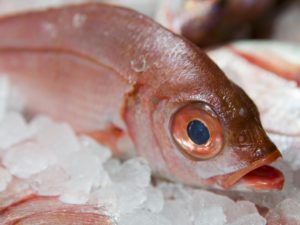Have you ever had a great day of fishing and wondered the best way to store fish? Please keep reading for some useful tips.

TO STORE FISH OVERNIGHT OR FOR MULTIPLE DAYS:
We recommend storing filleted fish in a sealable plastic bag. Squeeze as much air as possible from the bag before sealing. Immerse the sealed bag of fish in ice cubes and water and store in the refrigerator. Drain some of the water and add more ice once a day until you’re ready to cook your fish. This technique can be used for storing filleted or whole fish.
HOW LONG CAN DIFFERENT TYPES OF FISHES BE STORED?
Not all fishes are created equal when it comes to how long they will store well. Using the above storage method and assuming the fish you’re storing is either freshly caught or bought very fresh, these are general guidelines for different types of fish:
Lean white-fleshed fishes (bass, snapper, hake, pollock, haddock, monkfish, flounder, etc.), pelagic fishes (tuna, swordfish, etc.), and members of the salmonid family (trout, char, and salmon) should keep well for 3 to 5 days. Oily fishes (mackerel, bluefish, sardines, mahi mahi) are best consumed within 3 days of catch or purchase.
CAN FISH CAUGHT FRESH BE FROZEN?
Although freezing fish is not recommended, it’s better to freeze it than have it go to waste. Below are a few tips courtesy of Martha Stewart, if you do need to freeze your fresh catch:
When freezing, your goal is to make sure the freezing process happens as quickly as possible. Line a cookie sheet that will fit in your freezer with plastic wrap. Arrange your individual fish fillets in a single layer on the wrap, making sure they do not touch. Cover the fish on the tray with another piece of plastic wrap and freeze. After about 2 hours, the fish fillets should be frozen enough that they are firm and easy to handle. Once this is done, transfer the fish into a sealable freezer bag (squeezing out as much air as you can before sealing). Shrimp and squid will also freeze well using this technique. You should consume seafood frozen this way within 30 days.
We hope to see you on the water again soon. Stay healthy and safe.


